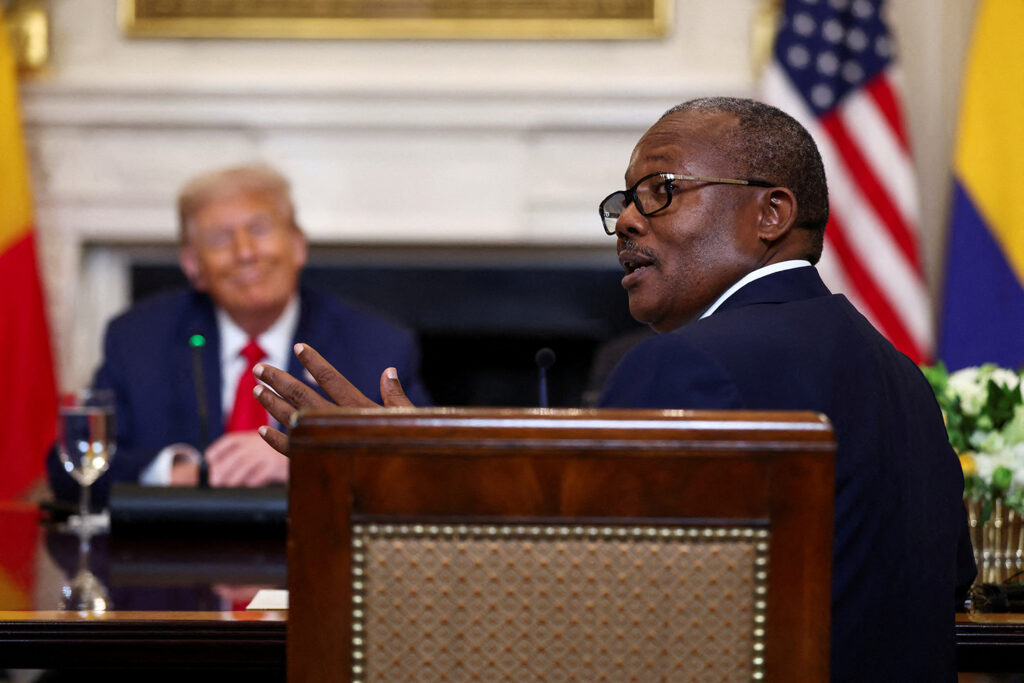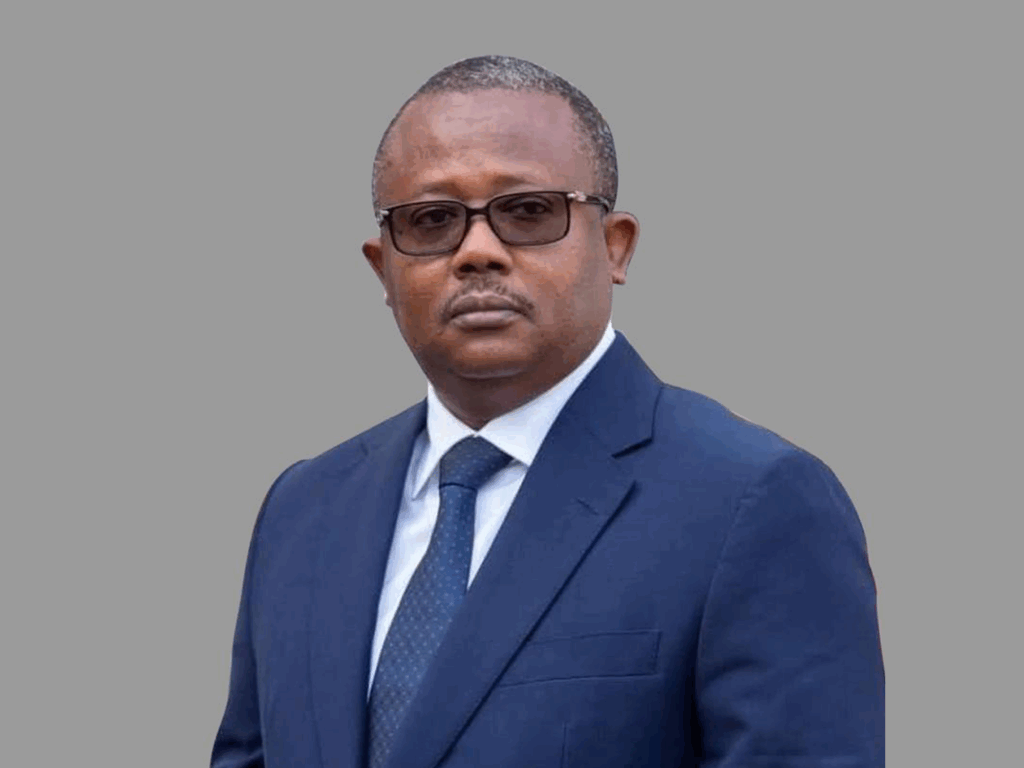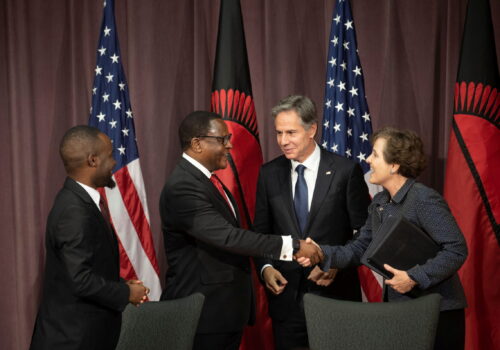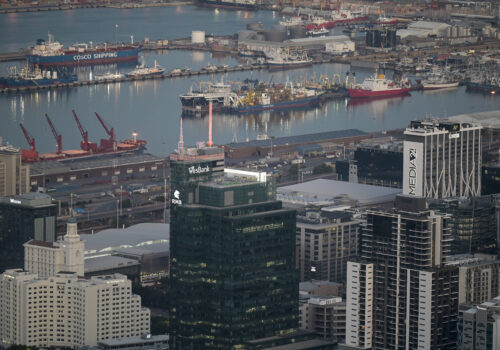Watch the event
China tends to show up to fulfill African countries’ needs more quickly, while there is a “delay” that is “too long” in working with the West, said President Umaro Sissoco Embaló of Guinea-Bissau. “How are we going to leave the Chinese?”
Embaló spoke Thursday at an Atlantic Council Front Page event hosted by the Africa Center, following a meeting with US President Donald Trump and four other African presidents—representing Senegal, Liberia, Gabon, and Mauritania—at the White House on Wednesday.
On the topic of Guinea-Bissau’s nonaligned foreign policy, which has seen Embaló meet with not only Trump but also Russian President Vladimir Putin and Chinese President Xi Jinping in the past year, Embaló said that he is “a free man” and that Guinea-Bissau never asks the United States or China who they maintain relations with. “Nobody can impose” on his country’s relationships with other powers, he said.
He added that Guinea-Bissau considers Russia and China “good friends” because when the African country was fighting for independence, they were “behind us . . . helping us.”
Below are more highlights from the conversation, moderated by Africa Center Senior Director Rama Yade, where Embaló talked about his meeting with Trump, US migration policy, and the challenges facing the African continent.
Migration moves
- Embaló said Trump’s proposal to have select African countries take in migrants from other countries that the United States wishes to deport would violate Guinea-Bissau’s own policies. If those migrants are citizens of another country, he asked, “why are we going to take them?”
- Contrary to some media reports, Embaló said the proposal was a topic of conversation at the African leaders’ lunch with Trump, but not yet an explicit ask; Embaló also said that there wasn’t a specific request made regarding the return of immigrants originally from the five African countries represented at the meeting.
- “We have procedures to do, and then here also they have procedures to do,” he said. “But if they are our citizens . . . [and] they are illegal here, if they want to go back to Guinea-Bissau, of course they are going back home.”
What happens next
- Embaló said that Trump received the five African leaders “very kindly” and that he appreciated how Trump “knows what he wants”—and has a “win-win partnership” in mind.
- Following the summit, Embaló said that he expects that more US businesses will invest in Guinea-Bissau. He highlighted opportunities related to the country’s minerals, specifically its phosphate, bauxite, and oil. If US companies “want to come to Guinea-Bissau,” he said, “they can come.”
- Embaló forecasted that Trump’s tariff policy would not have as profound an impact on the continent as it will in other regions because of Africa’s closeness with China—recently demonstrated by China’s commitment to remove tariffs on African exports. “Most of the countries, we have more relations . . . with China, not with the US,” Embaló explained.
- Embaló also said that his country likely wouldn’t be heavily impacted by the Trump administration’s decision to close the US Agency for International Development, but he added that the “department is very important.”
Search for peace
- Surveying the challenges facing the Sahel, Embaló said that African forces are “still fighting the jihadists.”
- While security missions led by the European Union, France, or the United States have ceased or been forced out of the region in recent years, Embaló argued that “it’s the time now” for the United States and the West more broadly to “come to join us to fight.”
- Embaló argued those countries have a responsibility because NATO “started this problem” when the Alliance intervened in Libya to depose dictator Muammar Gaddafi, an event that is considered a factor in the expansion of jihadist groups along and beyond the Libyan border. “The start of this issue hails from there,” he argued.
- On security, Embaló reflected on his work to mediate peace deals, a recent one being agreed upon in February, between the Senegalese government and factions of the Movement of Democratic Forces of Casamance, a separatist group. With his country having experienced independence efforts and civil war, Embaló said he thinks it is “important to be the peacemaker.”
Katherine Golden is an associate director on the Atlantic Council’s editorial team.
Watch the full event
Further reading
Thu, Apr 24, 2025
The Millennium Challenge Corporation could prove essential in the race for critical minerals. Reform it, don’t shut it down.
Issue Brief By Aubrey Hruby
As the Trump administration aligns foreign aid with core strategic interests, the MCC represents an underutilized asset.
Mon, Mar 17, 2025
To improve its Sahel policy, the US must update four assumptions
AfricaSource By
By reevaluating long-held assumptions and adapting policy to the rapidly changing geopolitical environment, the United States can play a vital role in the Sahel region.
Mon, Mar 31, 2025
How Trump could upend global finance—and how the world might respond
AfricaSource By
Concerns are growing—particularly among policymakers and experts in “New South” countries—about the direction in which the international financial system is heading.
Image: Guinea-Bissau's President Umaro Sissoco attends a lunch for African representatives of Gabon, Guinea-Bissau, Liberia, Mauritania, and Senegal hosted by US President Donald Trump in the State Dining Room at the White House in Washington, DC, on July 9, 2025. Photo via REUTERS/Kevin Lamarque.




